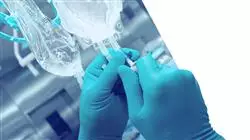University certificate
The world's largest faculty of medicine”
Introduction to the Program
With this Professional master’s degree you will incorporate the most advanced and current procedures for the management of Quality and Patient Safety”

Nowadays there is a broad consensus on the quality criteria of health services: efficiency, safety, people-centered, timely, equitable, integrated and efficient. Implementing and applying them on a daily basis contributes to the patient's own safety and satisfaction with the care received.
Given their relevance, it is necessary that physicians are aware of the latest methodologies, technological tools and elements that are incorporated in the different hospital centers in order to carry out a continuous improvement in health care. For this reason, TECH has designed this Professional master’s degree in Quality and Patient Safety that provides a complete update of knowledge in this field through a syllabus developed by a teaching team with outstanding experience in the sector.
It is a program that provides the latest developments in comprehensive care through methodologies that raise the humanization of health, incorporates the ethics of care and enhances research. Therefore, this academic itinerary will allow to deepen in the incorporation of Big Data and Machine Learning in clinical organizations and the predictive models used to increase safety, the most frequent errors and adverse events in clinical care.
Additionally, in this 12-month itinerary, the graduate will deepen with the most innovative didactic material in clinical risk management, pediatric patient safety, drug safety and advances in patient safety in surgical and pediatric block.
Consequently, the professional is facing an excellent opportunity to get an update through a flexible university program adapted to the real needs of physicians. Students only need an electronic device with an Internet connection to view the content of this program at any time of the day. An ideal opportunity to study a quality program at the academic forefront.
You are looking at a flexible program compatible with your most demanding daily responsibilities”
This Professional master’s degree in Quality and Patient Safety contains the most complete and up-to-date scientific program on the market. The most important features include:
- The development of case studies presented by health care experts in Quality and Patient Safety
- The graphic, schematic, and practical contents with which they are created, provide scientific and practical information on the disciplines that are essential for professional practice
- The practical exercises where the self-evaluation process can be carried out to improve learning
- Its special emphasis on innovative methodologies
- Theoretical lessons, questions to the expert, debate forums on controversial topics, and individual reflection assignments
- Content that is accessible from any fixed or portable device with an Internet connection
You have video summaries of each topic and multimedia pills that will help you in this process of updating your knowledge in Quality and Patient Safety”
The program includes in its teaching staff professionals of the field who pour into this training the experience of their work, in addition to recognized specialists from reference societies and prestigious universities.
Its multimedia content, developed with the latest educational technology, will allow the professional a situated and contextual learning, that is, a simulated environment that will provide an immersive training programmed to train in real situations.
The design of this program focuses on Problem-Based Learning, in which the professional will have to try to solve the different professional practice situations that will arise throughout the academic course. This will be done with the help of an innovative system of interactive videos made by renowned experts.
You will be aware of the use of Big Data and Machine Learning for the definition of predictive models in Patient Safety"

This program will take you deeper into the challenge of humanization as a determinant element of the quality of care"
Why study at TECH?
TECH is the world’s largest online university. With an impressive catalog of more than 14,000 university programs available in 11 languages, it is positioned as a leader in employability, with a 99% job placement rate. In addition, it relies on an enormous faculty of more than 6,000 professors of the highest international renown.

Study at the world's largest online university and guarantee your professional success. The future starts at TECH”
The world’s best online university according to FORBES
The prestigious Forbes magazine, specialized in business and finance, has highlighted TECH as “the world's best online university” This is what they have recently stated in an article in their digital edition in which they echo the success story of this institution, “thanks to the academic offer it provides, the selection of its teaching staff, and an innovative learning method aimed at educating the professionals of the future”
A revolutionary study method, a cutting-edge faculty and a practical focus: the key to TECH's success.
The most complete study plans on the university scene
TECH offers the most complete study plans on the university scene, with syllabuses that cover fundamental concepts and, at the same time, the main scientific advances in their specific scientific areas. In addition, these programs are continuously being updated to guarantee students the academic vanguard and the most in-demand professional skills. In this way, the university's qualifications provide its graduates with a significant advantage to propel their careers to success.
TECH offers the most comprehensive and intensive study plans on the current university scene.
A world-class teaching staff
TECH's teaching staff is made up of more than 6,000 professors with the highest international recognition. Professors, researchers and top executives of multinational companies, including Isaiah Covington, performance coach of the Boston Celtics; Magda Romanska, principal investigator at Harvard MetaLAB; Ignacio Wistumba, chairman of the department of translational molecular pathology at MD Anderson Cancer Center; and D.W. Pine, creative director of TIME magazine, among others.
Internationally renowned experts, specialized in different branches of Health, Technology, Communication and Business, form part of the TECH faculty.
A unique learning method
TECH is the first university to use Relearning in all its programs. It is the best online learning methodology, accredited with international teaching quality certifications, provided by prestigious educational agencies. In addition, this disruptive educational model is complemented with the “Case Method”, thereby setting up a unique online teaching strategy. Innovative teaching resources are also implemented, including detailed videos, infographics and interactive summaries.
TECH combines Relearning and the Case Method in all its university programs to guarantee excellent theoretical and practical learning, studying whenever and wherever you want.
The world's largest online university
TECH is the world’s largest online university. We are the largest educational institution, with the best and widest online educational catalog, one hundred percent online and covering the vast majority of areas of knowledge. We offer a large selection of our own degrees and accredited online undergraduate and postgraduate degrees. In total, more than 14,000 university degrees, in eleven different languages, make us the largest educational largest in the world.
TECH has the world's most extensive catalog of academic and official programs, available in more than 11 languages.
Google Premier Partner
The American technology giant has awarded TECH the Google Google Premier Partner badge. This award, which is only available to 3% of the world's companies, highlights the efficient, flexible and tailored experience that this university provides to students. The recognition as a Google Premier Partner not only accredits the maximum rigor, performance and investment in TECH's digital infrastructures, but also places this university as one of the world's leading technology companies.
Google has positioned TECH in the top 3% of the world's most important technology companies by awarding it its Google Premier Partner badge.
The official online university of the NBA
TECH is the official online university of the NBA. Thanks to our agreement with the biggest league in basketball, we offer our students exclusive university programs, as well as a wide variety of educational resources focused on the business of the league and other areas of the sports industry. Each program is made up of a uniquely designed syllabus and features exceptional guest hosts: professionals with a distinguished sports background who will offer their expertise on the most relevant topics.
TECH has been selected by the NBA, the world's top basketball league, as its official online university.
The top-rated university by its students
Students have positioned TECH as the world's top-rated university on the main review websites, with a highest rating of 4.9 out of 5, obtained from more than 1,000 reviews. These results consolidate TECH as the benchmark university institution at an international level, reflecting the excellence and positive impact of its educational model.” reflecting the excellence and positive impact of its educational model.”
TECH is the world’s top-rated university by its students.
Leaders in employability
TECH has managed to become the leading university in employability. 99% of its students obtain jobs in the academic field they have studied, within one year of completing any of the university's programs. A similar number achieve immediate career enhancement. All this thanks to a study methodology that bases its effectiveness on the acquisition of practical skills, which are absolutely necessary for professional development.
99% of TECH graduates find a job within a year of completing their studies.
Professional Master's Degree in Quality and Patient Safety
Nowadays, quality and patient safety have become fundamental aspects in the healthcare field, both in healthcare institutions and in daily clinical practice. Aware of the importance of training highly specialized professionals in this area, TECH Global University, a global leader in online education and home to one of the largest medical schools, presents its Professional Master's Degree in Quality and Patient Safety, a unique learning and updating opportunity for those interested in standing out in the healthcare field.
The Professional Master's Degree in Quality and Patient Safety is a unique learning and updating opportunity for those interested in standing out in the healthcare field.
The Professional Master's Degree in Quality and Patient Safety is a unique learning and updating opportunity for those interested in standing out in the healthcare field.
This postgraduate online class will provide you with the most up-to-date knowledge in quality management, patient safety and continuous improvement, providing you with the necessary tools to analyze, design and implement effective strategies in quality management in the healthcare environment. In addition, it will train you in the identification and management of risks, as well as in the application of international regulations and standards. With a practical and work-oriented approach, our Professional Master's Degree in Quality and Patient Safety will prepare you to lead successful projects to improve the quality of care and patient safety in any healthcare institution.







